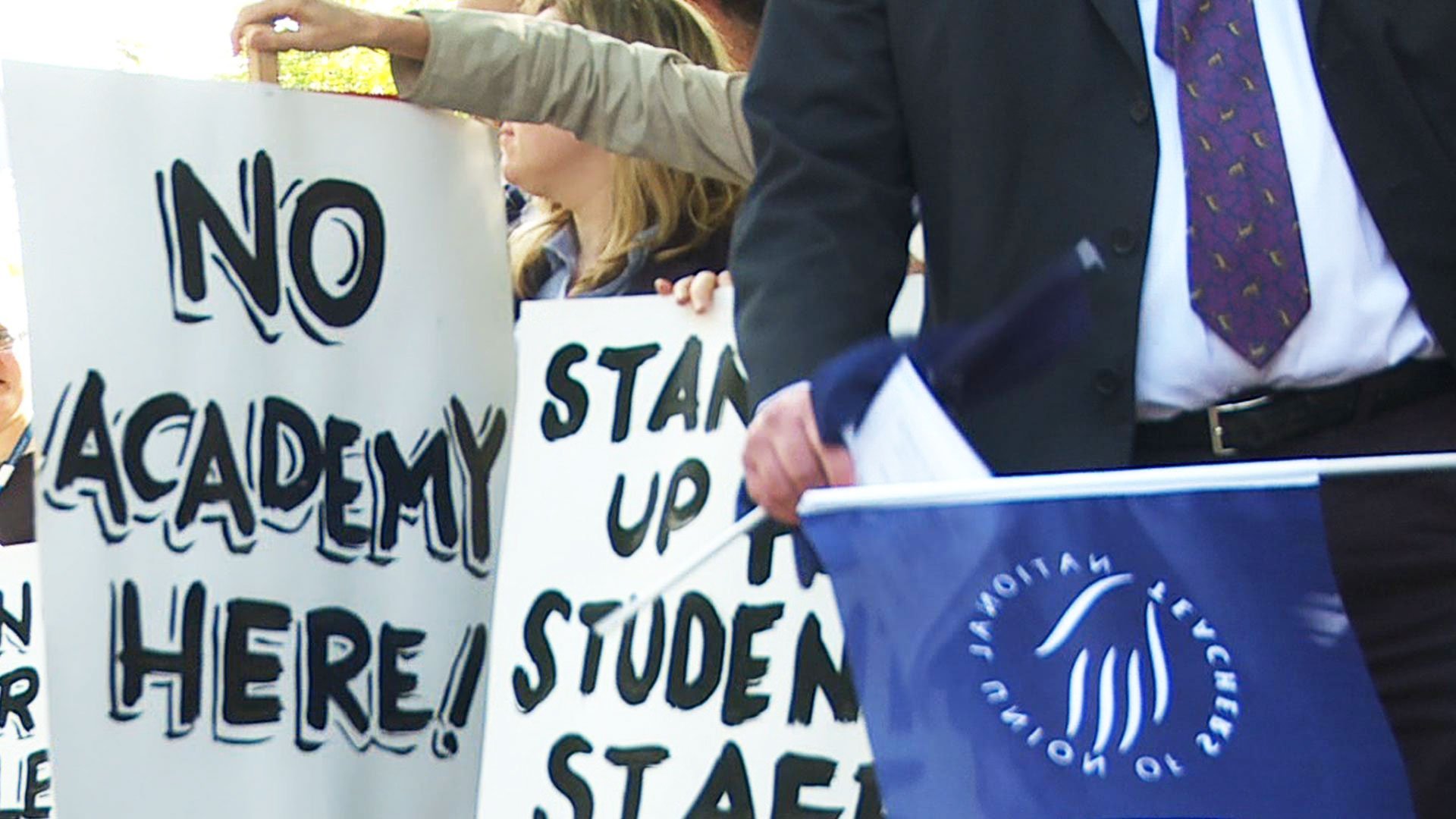The Tory government has raised the stakes in its campaign to privatise schooling in England by announcing that all state-funded schools must be academy schools within six years. But opposition to this forced academisation is already mounting, with teachers organising to take strike action against the Tories and their schemes.
The Tory government has raised the stakes in its campaign to privatise schooling in England by announcing that all state-funded schools must be academy schools within six years.
Academy schools are privately run by trusts, which are unelected and arguably unaccountable, often coming under the aegis of personal or corporate sponsors.
This latest Tory “flagship” policy was announced by George Osborne in his recent budget, and came with the publication of a Government White Paper which contained plans for a reorganisation of the education system involving the forced-academisation of 17,000 schools in England, taking them out of local authority control and into private hands. Speaking at the recent national conference of the National Association of Schoolmasters Union of Women Teachers (NASUWT), the Secretary of State for Education, Nicky Morgan, defiantly announced there is “no turning back” and “no reverse gear” on the scheme, raising the hackles of the assembled teacher delegates.
Tories in crisis
Even a senior Tory backbencher and chair of the Right-Wing 1922 Committee, Graham Brady, has come out saying that the policy could lead to the creation of “new and distant bureaucracies” rather than delivering the greater freedom and autonomy for schools that is promised. In particular, he warned of the anti-democratic consequences of the removal of parents from governing bodies. It is a significant development that even elements of the right wing are now chiming with the government’s long-standing critics from the Left, the labour movement and the teaching unions. “All that is solid melts into air”, as Marx once said.
At the recent Conference of the National Union of Teachers (NUT), delegates voted to ballot for strike action over the forced-academisation plans, and their General Secretary, Christine Blower, has proposed that the union should coordinate its actions with those of the junior doctors, whose ongoing dispute over terms and conditions has led to a sharp confrontation with Cameron’s hated government.
In addition to the junior doctors’ strike, the government’s vulnerability on its forced-academisation plans is further heightened by its recent parliamentary defeats over plans to scrap tax credits and slash disability benefits. Indeed, Brady’s intervention further undermines Cameron’s and Osborne’s authority, especially as it could signal a backbench rebellion that might well prevent the plans from entering onto the statute books. In the wake of Iain Duncan Smith’s resignation as Work and Pensions Secretary, and with the Tories tearing themselves to pieces over the EU referendum, the Tory backbench revolt is becoming manifest in unexpected ways.
Commodification and privatisation
Of course, Labour is seeking to capitalise on all this Tory disarray. Speaking at the Association of Teachers and Lecturers (ATL) conference, Shadow Education Secretary, Lucy Powell said, “I have been trying to make very sensible, rational arguments about why I feel forced-academisation is wrong and I think they are the same arguments I hear echoed by Conservatives in local government and in Parliament.”
“You look to build an alliance on the points you’re trying to win on.”
Labour predicted the scheme faced a funding shortfall of £1.3 billion. “It is a costly, bureaucratic reorganisation which is an ideologically driven process,” said Lucy Powell.
She added: “There is no school improvement argument as to why this reorganisation is necessary.”
However, such complaints fall short of a full critique of the government’s agenda in relation to education. It is not simply a Tory ideological crusade. Essentially the privatisation of schools leads to a transfer of material assets away from the public over to private – often corporate – interests. Further, this concrete change in the ownership of schools is reflected on the level of ideas, as the content of education becomes increasingly more competition-oriented and test-driven. It is also about turning education into a commodity, hence the move towards increasingly exorbitant tuition fees and treating children and young people as “customers”. The NUT rightly complains that the English school system is becoming an “exam factory”, and has threatened to boycott national tests taken by seven and 11 year olds and baseline tests. Christine Blower commented that, “Excessive and age-inappropriate testing of our primary school pupils is causing stress for children and concern to teachers. Much of it demands that children learn content before they are ready and nearly all of it is squeezing the life and creativity out of the curriculum.”
These tendencies towards the commodification and privatisation of education actually predate not only the present government and the Coalition – they find their roots at least as far back as the administration of Tony Blair. Let us not forget it was New Labour’s then Secretary of State, David Blunkett, who dreamed up the academy building programme, which was first enacted from 2002. The same Labour government further rolled out the introduction of National Curriculum Assessments (known as SATs), which were first introduced by the Tories from 1991 onwards. Rather than being a partisan, Tory “ideologically-driven project”, this agenda may be more accurately conceived as a capitalist tendency as expressed, peculiarly, in the educational sphere.
Far from being confined to England, the movement towards the privatisation and commercialisation of education is supra-national. Often referred to as GERM – the Global Education Reform Movement – concentrated in the USA and the UK, huge business interests are gathering, hoping to capitalise on commercial opportunities, especially in the context of the expansion of “affordable education” in the Global South. This truly global phenomenon, an aspect of globalisation, could even considered to be a late development of imperialism, as part of the ongoing search for new, global markets. As we have seen, the economic drivers for such “business opportunities” in education are having deep political and cultural implications, and must be resisted vigorously.
Fight the Tories with socialist policies!
Opponents of the growing role of profit, private ownership and the market in education must not rely solely upon what Lucy Powell calls an “alliance” of MPs against the forced-academisation plans. If we are to reverse the capitalist tendencies in our education system, it will be necessary to forge a links across the labour movement and call for all academy schools to be taken back into local authority control.
Further, we need to fight for a truly comprehensive education system – one that concentrates on providing for the needs of the child rather than the needs of capitalism and big business. Such a movement must necessarily involve teachers and, equally importantly, parents.
This is why Graham Brady’s criticism of the Tory forced-academisation scheme is so damaging to his own party leadership. For if ordinary people feel that academies herald the shutting out of parental views from school governance, they may well feel that it is time to revolt against the Tory programme for schools.
Such a campaign must dove-tail with the broader movement against Tory austerity and attacks which has galvanised around Jeremy Corbyn over the past year. The current strike ballot underway amongst NUT members is the first step in this process. The task now is for the rest of the labour movement leaders to organise coordinate action against the Tories. There is already talk of potential coordinated action between striking teachers and junior doctors. The next clear step is for the TUC to call a one-day general strike against austerity and in defence of education and the NHS.
Corbyn and Labour should now go on the offensive against the wounded Tories, taking up the fight against academisation as part of a bold, socialist programme to bring the levers of the economy and the main institutions of society, such as education and the NHS, into public ownership and control. Only then can we truly put an end to the anarchy of the market and begin to reverse the impacts and damage that capitalism has inflicted on our society.






